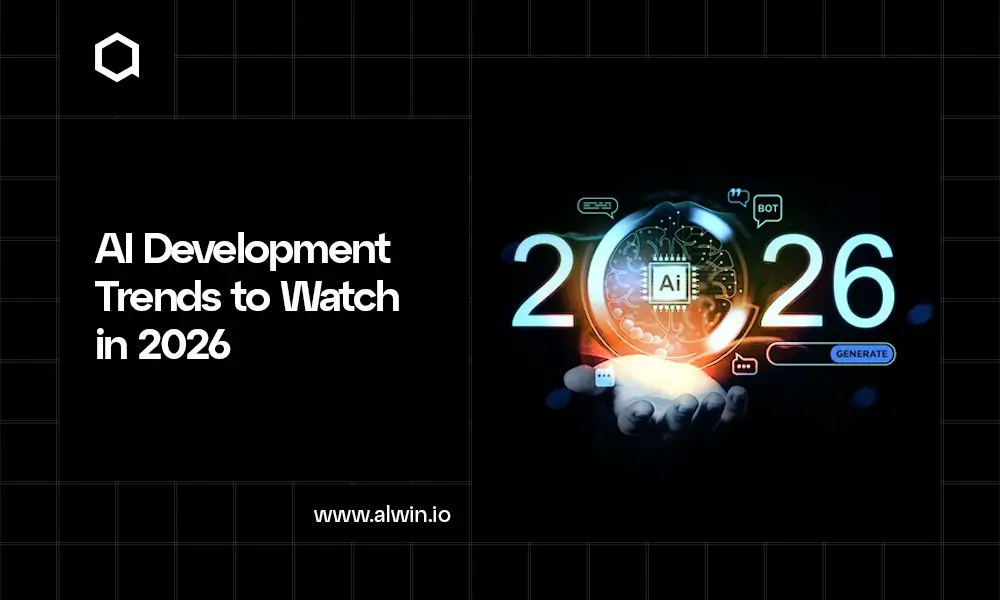Imagine if your favorite video games could think, adapt, and surprise you. Well, that's the magic happening behind the scenes as Artificial Intelligence (AI) meets the world of game development. In this blog, we'll talk about how AI and games are shaking hands and creating something pretty remarkable, as well as their converged components, history, challenges, and benefits.
The Convergence of AI and Game Development
AI and blockchain are converging to create new and innovative gaming experiences. Blockchain can be used to create decentralized gaming platforms that are more secure and fair, while AI can be made effective use of to create more intelligent and engaging games.
For example, blockchain can be used to develop play-to-earn games, where players can earn cryptocurrency by playing the game. This can create a more equitable gaming economy, where players are rewarded for their time and effort. AI will be of great help in creating more intelligent game opponents and more realistic game environments, which can immerse players in the game world.
History
Artificial intelligence (AI) has been used in video games since the early days of the industry. The first games to use AI were simple board games, such as Nim and checkers. In the 1970s, AI was used to create more complex games, such as Space Invaders and Pac-Man. In the 1980s, AI was used to create games with more realistic graphics and physics, such as The Legend of Zelda and SimCity.
In the 1990s, AI was used to create games with more complex gameplay, such as Doom and Quake. In the 2000s, AI was used to create games with more immersive worlds, such as Half-Life 2 and Grand Theft Auto IV. In the 2010s, AI was used to create games with more intelligent and adaptive enemies, such as Minecraft and The Witcher 3.
Key Components of AI in Game Development
Machine learning: It’s a type of AI that allows software to make accurate predictions devoid of being explicitly programmed. By utilizing this, AI models can be trained to carry out tasks, such as playing a game or generating content.
Deep learning: It is characterized by its ability to automatically discover and learn intricate patterns from data, enabling it to make complex decisions and predictions, often with human-level accuracy. This can be used to create AI models that are capable of learning complex tasks, such as recognizing objects or generating human-quality text.
Natural language processing: Natural language processing is a field of computer science that deals with the interaction between computers and human (natural) languages. Using this, we can create AI models that can understand and respond to human language.
Procedural Content Generation: AI is being used to generate procedurally generated content, such as levels, enemies, and items. This allows games to be more replayable and unpredictable. For example, the game No Man's Sky uses AI to generate procedurally generated planets, creatures, and plants.
Computer vision: A branch of computer science that empowers the extraction of information from digital images or videos. This can be used to create AI models that can see and understand the world around them.
Game theory: A field of mathematics that deals with strategic decision-making. This can be used to create AI models that can make decisions in competitive environments, such as games.
AI Algorithms in Game Development
Types of AI Algorithms in Game Development
Rule-based algorithms: These algorithms use a set of rules to determine the behavior of NPCs.
Finite state machines: Model the behavior of NPCs as a series of states and transitions.
Machine learning algorithms: Learn from data to make decisions.
Deep learning algorithms: A type of machine learning algorithm that uses artificial neural networks to learn from data.
Applications of AI Algorithms in Game Development
Non-player characters (NPCs): AI algorithms can be used to control NPCs in games, making them more realistic and challenging to interact with.
Procedural content generation: They can be used to generate new content for games, such as levels, characters, and items.
Personalized gameplay: They can be used to adapt gameplay to the individual player's preferences, such as their skill level or playstyle.
Benefits of Integrating AI in Games
More immersive experiences: AI can be used to create more realistic and lifelike characters, environments, and objects. This can make games feel more immersive and engaging for players.
More challenging and unpredictable gameplay: The optimization of AI will result in creating opponents that are more challenging and unpredictable.
New and innovative game experiences: It can be utilized to create new and innovative game experiences that are not possible with traditional methods. This can help the gaming industry grow and evolve.
Consult with our business experts to learn more about AI Game Development! Chat with us on WhatsApp
Blockchain's Influence on AI Game Development
Decentralized AI models: The AI model is trained on a decentralized network of computers, making it more secure and transparent. This is because no single entity controls the data or the model.
Provably fair games: The game logic is stored on the blockchain, which makes it tamper-proof. This ensures that the game is fair and that players cannot cheat.
NFTs: Non-fungible tokens (NFTs) can be used to represent ownership of in-game items. This gives players more control over their gaming assets and allows them to trade or sell them to other players.
New types of games: AI can be used to create new types of games that are not possible with traditional methods. For example, AI can be used to create games where players can interact with each other in a more realistic way.
Challenges and Considerations
There are a number of challenges and considerations that need to be addressed in order to make AI games successful.
One of the biggest challenges is data collection and labeling. AI systems need to be trained on large amounts of data in order to learn how to make decisions. This data can be difficult and expensive to collect, and it can also be time-consuming to label the data so that the AI system can understand it.
Another challenge is algorithmic complexity. AI systems can be very complex, and it can be difficult to design and implement algorithms that are both effective and efficient. This can lead to problems such as computational complexity and bias.
Fairness is another important consideration in AI game development. AI systems should be designed to treat all players fairly, regardless of their skill level, gender, or other personal characteristics. This can be a difficult challenge to address, as there are many different factors that can contribute to fairness in a game.
Ethics is also a key consideration in AI game development. AI systems should be used in a responsible and ethical way. This means that developers need to be aware of the potential risks and benefits of using AI in games, and they need to take steps to mitigate any potential risks.
Case Study: Decentraland
Decentraland is a virtual reality platform that uses blockchain technology to create a decentralized and secure environment for users to interact with each other and create content. AI is being used in Decentraland to create more realistic and engaging experiences for users.
For example, AI is being used to generate realistic avatars, create dynamic weather systems, and develop intelligent agents that can interact with users in the virtual world.
Case Study: Axie Infinity
Axie Infinity is a blockchain-based game that allows players to collect, breed, and battle digital creatures called Axies. AI is being used in Axie Infinity to create more challenging and rewarding gameplay.
For example, AI is being used to train Axies to fight more effectively, and to create new game modes that require players to use their strategic thinking skills.
Here are some other examples of how AI and blockchain are being used in games:
Gods Unchained: This blockchain-based card game uses AI to create more balanced and competitive gameplay.
The Sandbox: This virtual world platform uses AI to create more realistic and immersive environments
Sorare: This fantasy football game uses AI to generate player stats and ratings.
Conclusion
So, what's the big takeaway from this journey into the intersection of AI and game development? It's that we're witnessing a remarkable evolution in the gaming world. AI is no longer just a buzzword; it's become an integral part of how games are made and experienced.
As technology continues to advance, we can look forward to games that are not only visually stunning but also adapt to our every move, creating unique adventures every time we play.
So, as you gear up for your next gaming session, remember that AI is striving to make it an unforgettable adventure, and the future of gaming looks brighter than ever!



